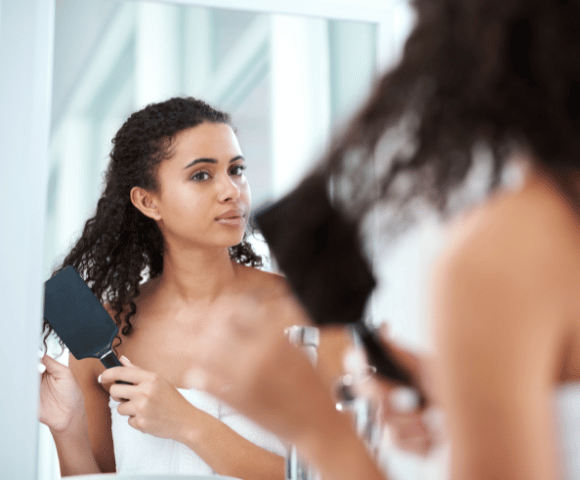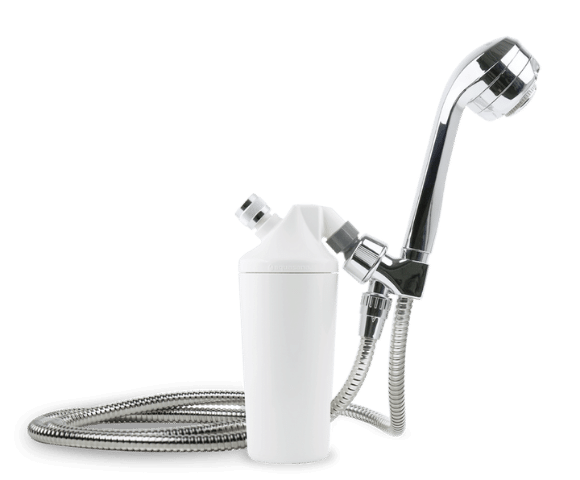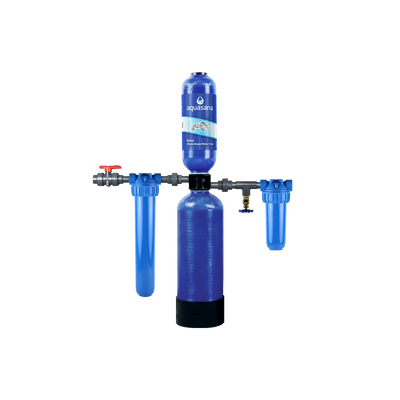Causes of frizzy hair after showering
There are several ways your shower routine might be contributing to frizz. From the temperature of the water to the products you use and how you handle your hair afterward, each step can affect frizz.
1. Humidity
Humidity can make hair frizzy because it causes hair strands to absorb moisture from the air, leading to swelling and changes in shape. As moisture is absorbed, the cuticle swells and lifts, causing it to appear frizzy, puffy, and unmanageable.
.jpg?sw=1920&sfrm=png)
2. Hair porosity
Hair porosity refers to how well your hair absorbs and retains moisture, which has major implications for your hair’s tendency to become frizzy after showering. High porosity hair has an open cuticle structure, allowing it to absorb moisture rapidly while washing or from humidity after a steamy shower. Since moisture can be easily absorbed, high-porosity hair is more susceptible to frizz. Conversely, low porosity hair resists moisture absorption, which makes it less susceptible to frizz, but harder for products to penetrate.
3. Hair texture
Hair texture plays an important role in how your hair responds after showering, particularly concerning frizz. Curly and wavy hair types are more prone to frizz because the bends and coils in your hair make it harder for natural oils to travel down the hair shaft, leading to dryness. However, even straight hair can become frizzy after showering if strands are damaged or don’t get enough moisture.
4. Harsh products
Harsh hair products, especially those containing sulfates and alcohols, can strip your hair of its natural oils, leaving it dry and more prone to frizz after showering. These ingredients can also disrupt the hair's cuticle layer, causing it to lift and allowing excess moisture to enter the hair shaft, leading to swelling and frizz.
5. Washing and drying habits
Certain washing and drying habits can contribute to frizzy hair after showering. Using hot water opens the hair cuticle, stripping natural oils and letting in more moisture than your hair needs. After showering, roughly drying your hair with a towel can create friction that damages strands and lifts the cuticle. Additionally, washing your hair too often can also strip away natural oils, leaving it dry, rough, and frizzy.
6. Shower water quality
Water quality, particularly the presence of chlorine, can significantly contribute to frizzy hair after showering. Chlorine strips strands of natural oils, drying out your hair and contributing to frizz. If you’ve noticed your hair is frizzy after being in a pool, chlorine is the cause, and its presence in your tap water can have the same effect when you shower at home.

How to prevent frizzy hair after a shower
To keep your hair smooth and manageable after showering, consider these effective and easy strategies to prevent frizz:
1. Avoid harsh hair products
Avoiding harsh hair products is a key step in preventing frizz after showering. Opt for gentle, sulfate-free shampoos and alcohol-free conditioners to maintain your hair's natural moisture balance. Incorporating nourishing products with ingredients like argan oil or coconut oil can also help smooth the hair cuticle and reduce frizz.
2. Turn down the water temperature
Hot water opens the cuticle, allowing excess moisture to enter and escape, resulting in frizz. In contrast, rinsing with cooler water helps keep the cuticle closed so that you don’t get too much water coming in or out. You don’t need to rinse with cold water, but consider turning down the temperature to lukewarm to prevent frizz.
3. Wash and dry more gently
Being gentle with your hair during washing and drying can make a big difference in keeping frizz at bay. Instead of rubbing your hair with a towel, try gently squeezing out the water using a soft cotton T-shirt or a microfiber towel to reduce friction. When it comes to detangling, use a wide-tooth comb and start from the ends, working your way up to avoid breakage.
4. Detangle hair while it's damp
Detangling your hair while it's damp can help minimize frizz and make styling easier. When hair is slightly wet, it's more flexible, allowing you to gently work through knots without causing breakage.
5. Diffuse hair when heat is needed
Using a diffuser when blow-drying your hair can help prevent frizz by distributing heat more evenly and gently, preserving your natural hair pattern. By using low heat and airflow settings, a diffuser minimizes disruption to your hair's cuticle, reducing the likelihood of frizz. This method is especially beneficial for curly and wavy hair types, as it helps maintain definition and smoothness during the drying process.
6. Switch to a silk pillowcase
Switching to a silk pillowcase can be a simple yet effective way to reduce frizz and keep your hair looking smoother in the morning. Unlike cotton, which can create friction and absorb moisture from your hair, silk provides a smooth surface that allows your hair to glide effortlessly as you toss and turn throughout the night, minimizing breakage and helping to retain natural oils.
7. Use a shower filter
If you've tried everything above and are still dealing with frizz after every shower, your water quality might be the culprit. Tap water often contains chlorine, which can strip your hair of its natural oils, leading to dryness and frizz.
Aquasana's shower filters are designed to tackle this issue effectively. They reduce over 90% of chlorine in your shower water, thanks to their combination of coconut shell carbon and patented Copper-Zinc (KDF) filtration media. This means less dryness and frizz, and more manageable, healthier-looking hair. Plus, Aquasana's filters are independently tested to NSF/ANSI Standard 177, ensuring their performance in reducing chlorine.
Ready to say goodbye to post-shower frizz? Upgrade your shower experience with the Aquasana Shower Filter, designed to remove chlorine for healthier skin and hair.

SHOWER FILTER
Shower Filter with Handheld Wand - Chrome
Enjoy healthier hair and skin while removing chlorine. Includes upgraded chrome massaging handheld wand.



